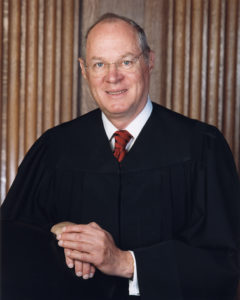
United States Supreme Court Justice Anthony Kennedy has announced he plans to retire effective July 31.
Kennedy was appointed by President Ronald Reagan (R) in 1987, and he took office in 1988 after a unanimous confirmation in the United States Senate. At the time of his confirmation, Kennedy was widely regarded by members of both major parties as a measured and fair jurist. In the decades since, he has often served as the “tie-breaker” in narrow 5-4 decisions that split the court’s “liberal” and “conservative” wings.
Kennedy has a mixed record on human and civil rights. Although he has typically ruled in support of free speech and the freedom of religion, and has ruled in favor of the right to keep and bear arms at least within the home, he also rules consistently against the fundamental right to life. In addition, Kennedy sided with the anti-rights majority in allowing governments to seize private property for private use (Kelo v. City of New London).
President Donald Trump (R) has the constitutional authority to nominate a replacement for Kennedy, and that nomination must be confirmed by the Senate. The court is currently tied with four “liberal” justices, four “conservative” justices, and Kennedy as the “swing vote.” If Trump makes a solidly conservative nomination, it would shift the ideological balance of the court to a narrow conservative majority.
